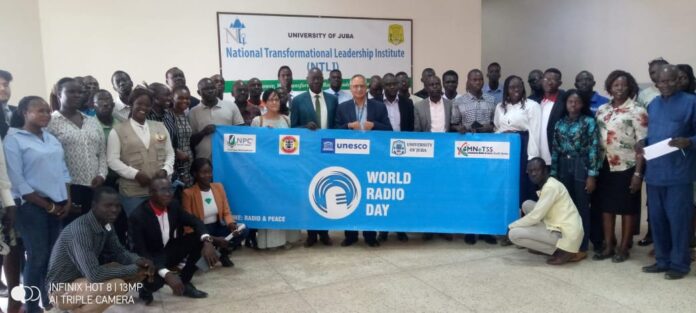The Association for Media Development in South Sudan has called on the government of Eastern Equatoria State to give media practitioners the freedom to express themselves and access information in the state.
This came during World Radio Day at Torit Freedom square on Monday.
Josephine Achiro the secretary for AMDISS says if journalists have access to information it will benefit the communities at the grassroots level with vital information.
Achiro discourages the idea of terming journalists as people working against the government saying they are to bridge the gap between civilians and the state authority.
She appeals to politicians to open doors free for media personnel to access information for public consumption.
“We are working to had to regard the issue of freedom of express access to information, Hon minister for the benefit of our people let us make a peaceful environment for media in Eastern Equatoria state, in particular, Torit more especially Torit because this is the capital where the information is supposed to be sent so if it is not good that means other parts will not get information.”
Achiro says journalists are not working for themselves but for the benefit of the community therefore she asks the authorities to present accurate information to avoid feeding the public with wrong information.
She however appreciates Eastern Equatoria Government for cooperation with the media practitioners in the state.
“Even if people are being killed so the right information has to be given, to avoid rumors from any radio station, but if the right information is given it will help them, so people of eastern Equatoria state let us make our state better.”
On his part honorable Patrick Oting Cyprian, the Minister of information in Eastern Equatoria state says the state authority is willing to give any information to the media for public consumption.
Minister Oting says Eastern Equatoria Government respects Article 24, sub-article 1 and 2 which spell out freedom of expression and access to information from all reliable sources,” she said.
The undersecretary of information telecommunication and postal service has urged journalists to be accurate in their reporting and stop fearing politicians.
Yath Awan Yath says journalists should always avoid one side story because it makes no sense when a journalist is not balancing the story.
“As a journalist, if you have an idea don’t leave talking about that idea until you are sure that thing has been understood and you know that the message has been received, there can be no way that you can take a journalist or a media from one side.”
The United Nations Educational, Scientific and Cultural Organization representative Tap Raj says partners are committed to supporting the radio in South Sudan, especially the community radio. Community radio has a big role in South Sudan, it can inform the high number of people in the community, “he said.”
He says radio can end the ongoing conflict in South Sudan by bringing the people to the radio stations and they dialogue together.
“Radio is the one image to bring people to make them dialogue together, for example, radio can organize and bring those affected by inter-communal conflict and engaging them to reconcile.”
He urges the media practitioners to focus on reporting on agriculture, education, and health issues in South Sudan.
The chairperson of the National Press Club, Bullen Kenyi Yatta, appreciates the great work radio stations are doing in society, especially during the pandemic and other issues that affect South Sudan.

